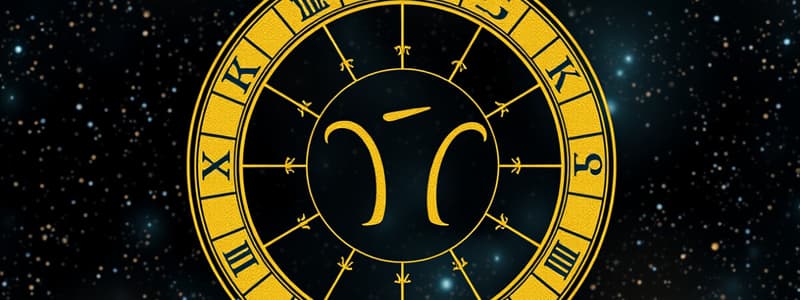Podcast
Questions and Answers
What is the main premise of astrology?
What is the main premise of astrology?
- It studies celestial positions to interpret human affairs. (correct)
- It predicts future events using historical data.
- It is based on scientific principles.
- It uses mathematical models to predict events.
Which ancient civilization is NOT mentioned as having developed an astrological system?
Which ancient civilization is NOT mentioned as having developed an astrological system?
- Maya
- Hindus
- Romanov (correct)
- Ancient Greeks
When did astrology begin to be recognized as a pseudoscience?
When did astrology begin to be recognized as a pseudoscience?
- In the 2nd millennium BCE
- In the 16th century
- In the 18th century (correct)
- During the Enlightenment
Which of the following best describes contemporary Western astrology?
Which of the following best describes contemporary Western astrology?
How did astrology relate to scholarly traditions prior to the Enlightenment?
How did astrology relate to scholarly traditions prior to the Enlightenment?
What significant change occurred to astrology during the Enlightenment?
What significant change occurred to astrology during the Enlightenment?
Which of the following figures is NOT associated with astrology in literature?
Which of the following figures is NOT associated with astrology in literature?
What role did celestial observations play in early astrological practices?
What role did celestial observations play in early astrological practices?
Flashcards are hidden until you start studying
Study Notes
Overview of Astrology
- Astrology involves divinatory practices aimed at gleaning information about human affairs from celestial positions.
- Recognized as pseudoscientific since the 18th century.
Historical Context
- Originated in the 2nd millennium BCE within calendrical systems for predicting seasonal changes.
- Cultures, including Hindus, Chinese, and Maya, created complex systems to interpret celestial cycles as divine signs.
Western Astrology
- One of the oldest astrological systems, tracing its origins to 19th–17th century BCE Mesopotamia.
- Spread to Ancient Greece, Rome, the Islamic world, and further into Central and Western Europe.
Contemporary Practice
- Modern Western astrology often revolves around horoscopes, linking celestial positions to personality traits and life events.
- Professional astrologers predominantly utilize these horoscope systems.
Historical Significance
- Prior to the Enlightenment, astrology was viewed as scholarly and was interconnected with astronomy, meteorology, medicine, and alchemy.
- Influential figures in literature, such as Dante Alighieri, Geoffrey Chaucer, and William Shakespeare, referenced astrology, illustrating its cultural relevance.
Decline of Scholarly Status
- The Enlightenment marked a shift, leading to astrology losing its acceptance as a legitimate academic discipline.
- The end of the 19th century saw the advent of the scientific method, which undermined astrology's credibility through theoretical and empirical challenges.
Resurgence
- Despite losing its academic standing in the Western world and a decline in common belief, astrology began to experience a resurgence starting in the 1960s.
Studying That Suits You
Use AI to generate personalized quizzes and flashcards to suit your learning preferences.




